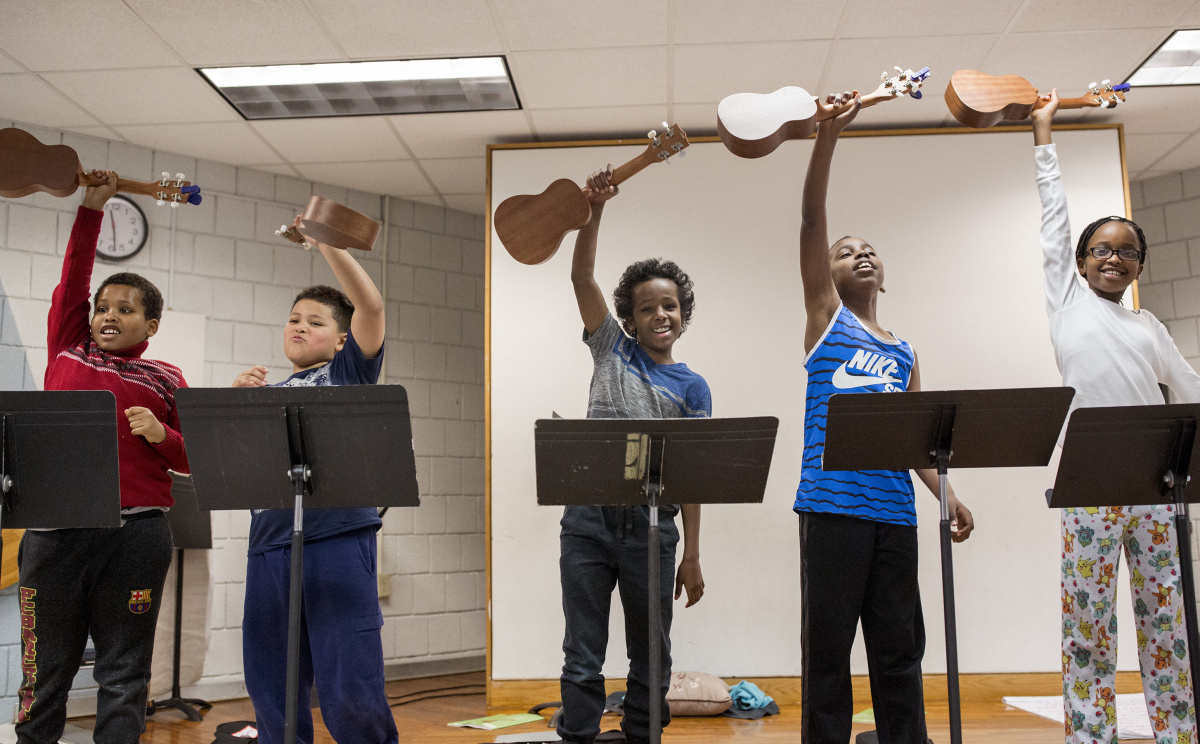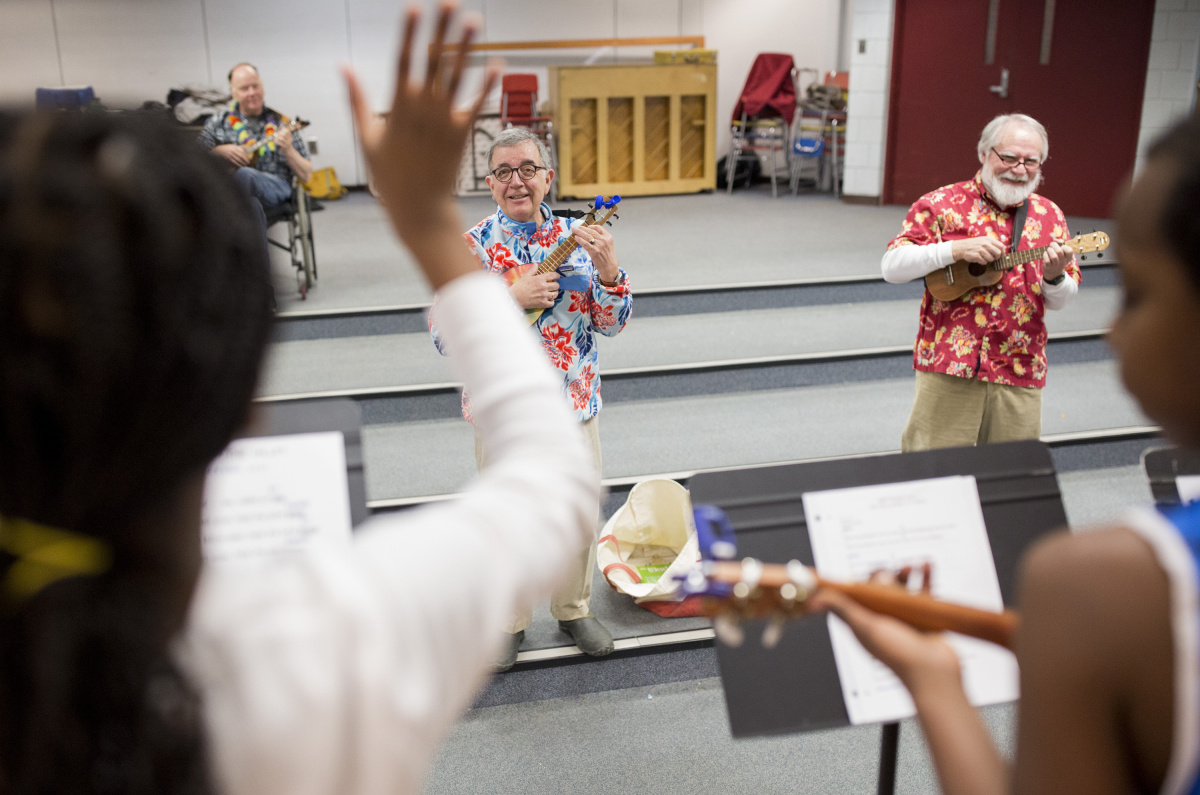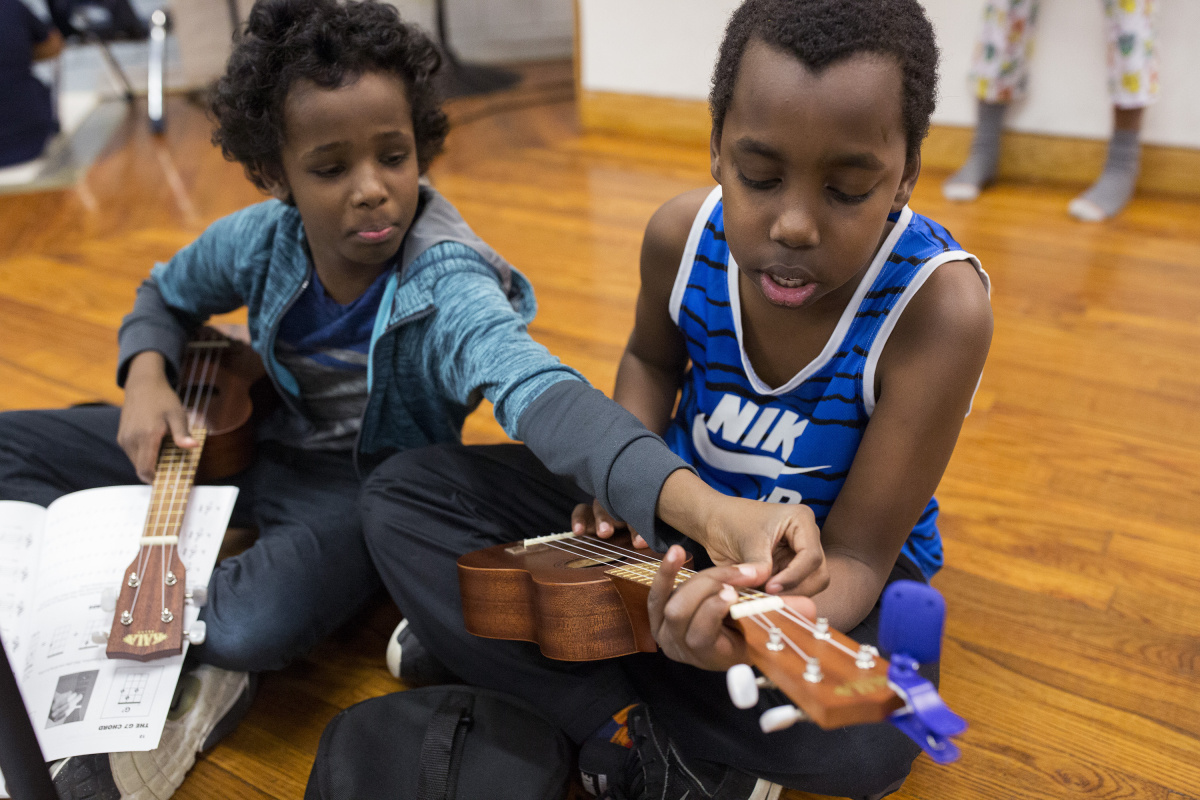The halls of Riverton Elementary School in Portland were quiet Friday when the stars of the day’s featured concert bounded into the music room.
In a rush of smiles and hellos and cheers, the six performers grabbed their ukuleles and hopped onto the stage.
“Knock yourself out. Get it out of your system,” Lee Urban told the elementary-aged students in his ukulele camp as they strummed their ukuleles and wiggled their hips.
It had been four days since the kids picked up ukuleles for the first time and it was already time for their first big performance. But first, Urban had a surprise for the students in the camp offered by LearningWorks as part of its after-school program.
As the kids watched – and wiggled – Urban handed each a gig bag and told them to take out the instrument inside.
“Here’s the thing. They’re yours,” he said. “To keep forever. FOREVER!”

The kids stared at him, first in disbelief, then as they jumped up and down on the stage. There were screams and shouts.
“You’re lying,” said 9-year-old John Cubahiro. He could only be convinced the ukulele was really his when his band mates pointed out there was no “property of Lee Urban” sticker on the back of the diminutive instrument.
After a few minutes of excited chatter, Urban and the contingent of Hawaiian shirt-clad volunteers he brought with him, helped the kids tune their new ukuleles so they could start their dress rehearsal.
“Row, row, row your boat,” they sang as they enthusiastically strummed their ukuleles. Their voices grew louder and louder, filling the room and eliciting enthusiastic cheers from Urban.
‘SMILE-INDUCING INSTRUMENT’
Urban, a former planning director for the city of Portland, has played instruments nearly his entire nearly his entire life, starting with the tuba in middle school. He tried the flute, piccolo and saxophone before finally settling on the guitar. Four years ago, after developing arthritis in his fingers, he began researching the ukulele. Around the same time, a student brought her ukulele into school.
“That was the beginning. An hour later I bought my first ukulele,” said Urban, who now owns close to 50. “What I found is it’s a very social, smile-inducing instrument.”

Urban found the ukulele at a time when the popularity of the instrument is seeing a surge in popularity. Between 2010 and 2012, ukulele sales in the U.S. jumped from 581,000 to more than a million, according to the National Association of Music Merchants. While people of all ages play the ukulele, teens have been a big part in the surge in popularity of the ukulele.
Musicians like Jack Johnson and Eddie Vedder, who was nominated for a Grammy for his album of ukulele songs, have drawn more attention to the instrument long associated with Hawaii. Grace VanderWaal, the 12-year-old winner of NBC’s “America’s Got Talent,” became wildly popular with the younger set because of the original songs she writes and play on her ukulele.
Ukuleles are far less expensive than a guitar, with prices starting around $30. And, says Urban, they’re easier for many people to play because they don’t need to read music and only have to learn three chords.
“You can play within minutes. It’s instant gratification,” he said.
After learning how to play, Urban started a group of ukulele enthusiasts that has grown to include about 90 people and meets monthly at St. Luke’s Cathedral, and organized a ukulele festival. In September, the fourth annual Casco Bay Ukulele Festival will feature workshops and a concert by well-known ukulele musicians Jim and Liz Beloff. Last year, 400 people attended the festival.
Urban also started the nonprofit Ukuleles Heal the World, which he describes as a grassroots effort by lovers of ukuleles to share the instrument with others. In December, an online fundraiser for the group raised more than $4,000 to buy ukuleles for schoolchildren and the music therapy program at Barbara Bush Children’s Hospital.
IMPORTANCE OF MUSIC EDUCATION
As much as he loves playing ukulele with other adults, Urban wanted to involve more children from the community. After leaving his job with the city of Portland, he earned his teaching certificate and now co-teaches part time in a first-grade classroom. He approached LearningWorks to see about teaching ukulele to the students the Portland-based agency serves through its after-school programs.

Trina Dorn, assistant director of after-school programming for LearningWorks, knew it would be a good fit. Most of the students in the after-school programs come from families that can’t afford extra music and art enrichment opportunities, but Urban’s camps give them an opportunity to grow their self-confidence by learning how to play.
Dorn said students are drawn to Urban’s enthusiasm and humor.
“They see him as a grandfather. They kids warm up to him so quickly,” she said.
During the first camp, Urban told the kids they’d be able to perform a concert in just four days.
“They all moaned, yet on the morning of the concert, they were incredibly excited to perform,” he said. “They all love the adulation of their peers.” That same excitement has been shared by the students in all nine ukulele camps Urban has offered through LearningWorks. Even kids who start the week slumped in their chairs end the week enthusiastic about showing off their new music skills, Urban said.
“I’m always moved when I run into the mother of a kid who says, ‘I’ve never seen him so happy,’ ” he said. “My hope is the experience of ukulele camp has given them a much stronger sense of possibilities they can take advantage of and that they can succeed. There’s no failure in ukulele land.”
THEY WON’T BE TAKING AUTOGRAPHS
The six students who performed at Riverton on Friday started their time at Urban’s ukulele camp on Tuesday. A half-hour into their first lesson, they had to take a break for graham crackers because their fingers were sore from holding down the strings. They learned “Row, Row, Row Your Boat” first because it’s the easiest song to play.
For the concert, the students chose to start with that song, then perform “Down in the Valley” and “Skip to My Lou.” The last song is the favorite of Cubahiro, the fourth-grader who couldn’t quite believe he’s now the owner of his own ukulele.
“I like ‘Skip to My Lou’ because you have to sound happy and some parts you have to sound sad,” he said.
Enora Bizimana, a 9-year-old fourth-grader, prepared for the show by double-checking her sheets of music, arranging them neatly on the stand in front of her.
“It’s going to be a better world if people teach other people how to play the ukulele,” she said.
Albert Urquia-Sanchez, whose enthusiasm for performing was evident even when there was no audience, had a last-minute suggestion for the concert.
“The first thing we need to say is no autographs after the show,” he said from his spot on stage.
In the final minutes before other LearningWorks students arrived for the show, Urban led the students in an oath about taking care of their ukuleles and learning new songs.
“But mostly I will play my ukulele to have fun,” they repeated in unison, their hands over their hearts.
And they did have fun. Their friends cheered as the kids on stage performed a rousing rendition of each song. Their strumming and singing grew louder and more enthusiastically with each verse.
“Lou, Lou, skip to my Lou. Skip to my Lou, my darling,” they finished, raising their ukuleles above their heads and cheering along with the audience.

Comments are no longer available on this story